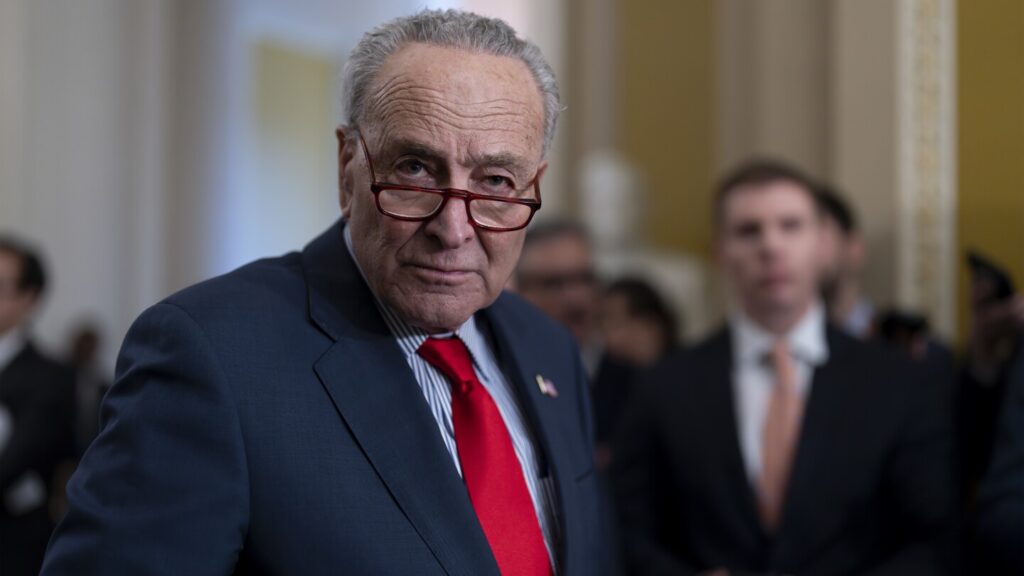WASHINGTON (AP) — President Joe Biden and Congressional leaders announced Tuesday they have reached an agreement on a final spending bill for this year. The question now is how quickly lawmakers can pass the bill to avoid passing the bill in parts. government shutdown.
Biden has said he will sign the bill package as soon as he receives it, but time is running out. Legislative staff need time to complete the text of the bill, which is a difficult task. There is a rule in the House of Representatives that gives members 72 hours to consider bills before voting. And the Senate has never been known for its sprinting ability. Meanwhile, funding for several key institutions will expire at midnight Friday.
Biden, a Democrat, said in a statement Tuesday morning that he had “reached an agreement with Congressional leaders on how to proceed with the remaining year-round funding bill.” “The House and Senate are currently working on a final version that can be brought to the floor quickly, and I intend to sign it immediately.”
Work on a final spending bill stalled late on over funding for the Department of Homeland Security, but the contours of the bill were resolved late Monday. House Speaker Mike Johnson (R-Louisiana) said relevant committees are currently drafting legislation that will be considered by the full House and Senate “as soon as possible.” New York Democratic Leader Hakeem Jeffries issued a similar statement, saying Congress would consider the package “in the coming days once the drafting process is complete.”
The move comes nearly six months into the fiscal year, but Congress is only halfway through passing a spending package expected to total about $1.65 trillion.Member of Parliament passed the first part This equates to approximately 30% of annual discretionary spending. Lawmakers are now focused on larger policy, adjusting to what has become routine shutdown deadlines.
The package is expected to provide approximately $886 billion to the Department of Defense. Funds will also be provided to the Department of Health and Human Services, the Department of Labor, and others.
Overall, the two spending packages will boost defense spending by about 3%, while keeping non-defense spending roughly flat from a year ago. This is in line with an agreement reached by former Speaker Kevin McCarthy. It went well The White House has capped spending for two years and suspended the debt ceiling until January 2025 to help the federal government continue paying its bills.
AP Washington correspondent Sagar Meghani reported that the White House and Congressional leaders say they have reached a spending deal that averts a potential government shutdown this weekend.
House Republicans are determined to end the practice of combining all 12 annual spending bills into one giant bill called an omnibus. They this time he managed to split the expense bill into two parts.
With the bill likely to be announced late Tuesday, the House's 72-hour rule means Congress won't consider the bill until late Friday, hours before the budget expires. In that case, Prime Minister Johnson would likely have to introduce the bill through a streamlined process that would require two-thirds support.
Most of the “no” votes are expected to come from Republicans, who are expected to push back not only on overall spending levels but also on some issues, including restricting access to abortion and eliminating diversity and inclusion programs within federal agencies. has criticized the lack of policy mandates sought by conservatives. , and banning gender-affirming care.
The Senate will then act on the bill, but all senators must agree to speed up the process to a final vote by a deadline of midnight Friday. Such agreements typically require Senate Majority Leader Chuck Schumer of New York to allow various amendments to the bill to be brought to a vote in exchange for a faster final vote. Schumer said Tuesday he wants to avoid a decline in government services.
“We haven't had a government shutdown since 2019. There is no good reason to shut down this week now that we are nearing completion,” Schumer said.
One of the provisions of the bill would give eligible Afghans who helped Americans during the nearly 20-year war in Afghanistan despite great personal risk to themselves and their loved ones. The plan is to grant special immigrant visas to 12,000 people. Without Congressional action, the State Department could run out of such visas by the end of the summer. put thousands of people at risk Number of Afghans seeking safety in the United States
The news was welcomed by advocacy groups. Sean Vandiver, a Navy veteran and president of #AfghanEvac, a coalition supporting Afghan resettlement efforts, said the bill would be a “clear victory” if it ultimately passes.
“This is not enough visas to help all our allies in Afghanistan, but it gives us a little bit of leeway and tells our partners in America's longest war that we are leaving them behind. It's going to show that we don't do that,” Vandiver said.
___
Associated Press staff writer Rebecca Santana contributed to this report.


